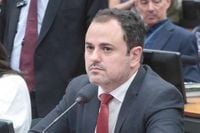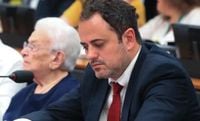On Wednesday, April 16, 2025, federal deputy Glauber Braga (Psol-RJ) marked the eighth day of his hunger strike, totaling over 180 hours without food. This protest is taking place in the Chamber of Deputies following the Ethics Council's recommendation to revoke his mandate, a decision that has ignited significant political and public support.
Braga's hunger strike began after the Ethics Council approved the motion for his mandate's revocation by a vote of 13 to 5 on April 8, 2025. The council's decision stemmed from a complaint filed by the Novo party in April 2024, after Braga was filmed expelling far-right activist Gabriel Costenaro from the Chamber, an incident that escalated into physical confrontation.
As he continues his protest, Braga has been consuming only isotonic drinks and water, and he is being monitored by medical staff twice daily. "I’m on the 8th day of hunger strike. Arthur Lira is the face of what is worst in Brazilian oligarchic power. If I accept defeat by the power of money, it will encourage the persecution of other leaders and popular mandates across the country. That’s why I RESIST!" he stated on his social media platform X.
Despite the physical toll, which has seen him lose over four kilograms, Braga remains resolute. He reported feeling emotionally challenged but determined, having slept only four hours the previous night. Medical assessments indicated that his health metrics, including urea and creatinine levels, are within normal ranges, though he experienced mild headaches and gastrointestinal discomfort.
Braga’s situation has drawn widespread attention, with support pouring in from various sectors, including ministers, fellow parliamentarians, and public figures. A vigil was organized in front of the Chamber on April 15 to demonstrate solidarity with him and protest against the Amnesty Bill. Activists like Laura Lima emphasized the importance of this show of support, stating, "Glauber’s case affects democracy due to the persecution he is facing. This vigil is crucial to show our indignation and solidarity."
His wife, fellow deputy Sâmia Bonfim (Psol/SP), has been actively involved in strategizing an appeal against the Ethics Council's decision. She noted that the Psol party has until April 22, 2025, to submit their appeal to the Constitution and Justice Commission (CCJ). The party is currently weighing their options, including the possibility of a comprehensive legal document that could bolster their case.
Braga’s supporters argue that the punishment he faces is disproportionate, particularly as there is no precedent for a mandate revocation under similar circumstances. They believe that the actions against him are politically motivated due to his vocal criticisms of the so-called "secret budget" practices, which he claims undermine fiscal accountability.
Deputy João Leão (PP-BA), who voted for Braga's mandate revocation, expressed that Braga’s behavior during the Ethics Council's proceedings was unacceptable. Leão stated, "He dug his own grave by disrespecting his peers, calling the rapporteur and the former president of the Chamber 'thieves'. He cannot continue in this role."
In response, Braga has accused Lira and others of orchestrating his removal due to his allegations of corruption regarding the allocation of parliamentary amendments. Lira has denied these claims, asserting that Braga's accusations lack concrete evidence.
Support for Braga has been multifaceted, with notable figures from various political backgrounds visiting him, including ministers from the Lula government. On April 15, ministers Sonia Guajajara and Paulo Teixeira visited him, along with other left-leaning parliamentarians. A samba event was also held in his honor, showcasing the cultural solidarity surrounding his plight.
As the political landscape continues to shift, the implications of Braga's potential mandate revocation raise concerns among lawmakers about the future of democratic discourse in Brazil. Many visiting parliamentarians have expressed worries about the precedent this case could set for other leaders facing similar challenges.
Braga's hunger strike and the political drama unfolding in the Chamber of Deputies highlight the contentious nature of Brazilian politics today. The decisions made in the coming days could resonate far beyond his individual case, affecting the dynamics of power and representation in the Brazilian political arena.
As the situation develops, Braga remains steadfast in his commitment to resist, stating, "I will endure as long as necessary to change this scenario. I remain strong." With the deadline for the appeal approaching, the political stakes are high, and the eyes of the nation remain fixed on the outcome of this contentious struggle.








